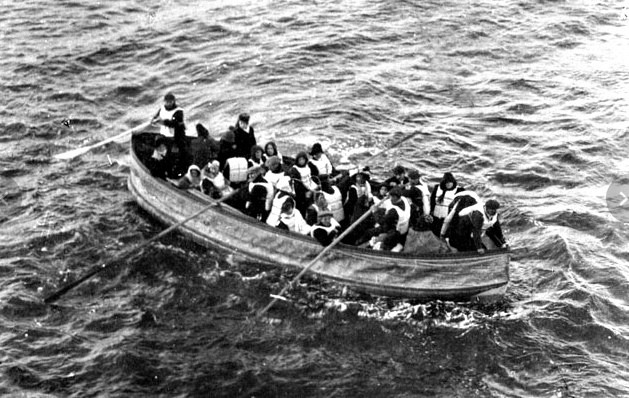Dutch Uncle
* Tertia Optio * Defend the Constitution
Lots of JPP political discussions involve strife and the loss of human life. Part of this discussion is "should our government only care about the lives of the citizenry" vs. "should our government remain the leader of the Free World and an international bastion of democracy"?
Another part is ethics: Should we choose to become involved, either domestically or abroad. While lots of involvement is simply funding AKA paying someone else to do the work, often it applies to the use of force. Decisions have to be made on how much force and when to use it.
While the Ukrainians under attack continue to be a major issue, many people are concerned about the plight of Gazans. They see the immediate need of people in suffering. Hence the discussion on when, where and how much the US government should become involved in the lives of citizens, foreign or domestic.
Decisions, decisions like lifeboat captain decisions. There are a few variations of the Lifeboat Dilemma, including the harsh one of the four sailors linked below, but the Titanic lifeboat captain scenario seems most common for people.
We, as caring, loving people have to decide on who we help and who we can't. Sure, some people are evil fucks who don't want to help anyone but themselves, most people do give a shit. They want to help, but there's a limit.
It's part of socialization and part of family love. Most Americans grow up loving their parents, their siblings and their friends. It comes naturally in a society of people who respect each other's rights. We want to help each other. Mostly, IMO, out of survival, but also out of socialization.
Now comes the question: Since you can't save every puppy and kitten on the planet, what is your Plan B?

 ethicsstupid.com
ethicsstupid.com

 ethicaldecisions.net
ethicaldecisions.net

 studycorgi.com
The Lifeboat case describes an incident where four sailors were stranded in the middle of the Atlantic. They had run out of food, were starving, and decided to kill one sailor for the survival of the rest. The remaining three sailors were rescued and tried in the court of British law and argued that they did not commit murder out of premeditation. They stated that it was a necessary action for the survival of the group. This case provides an interesting ethical dilemma that must be examined in detail.
studycorgi.com
The Lifeboat case describes an incident where four sailors were stranded in the middle of the Atlantic. They had run out of food, were starving, and decided to kill one sailor for the survival of the rest. The remaining three sailors were rescued and tried in the court of British law and argued that they did not commit murder out of premeditation. They stated that it was a necessary action for the survival of the group. This case provides an interesting ethical dilemma that must be examined in detail.
Another part is ethics: Should we choose to become involved, either domestically or abroad. While lots of involvement is simply funding AKA paying someone else to do the work, often it applies to the use of force. Decisions have to be made on how much force and when to use it.
While the Ukrainians under attack continue to be a major issue, many people are concerned about the plight of Gazans. They see the immediate need of people in suffering. Hence the discussion on when, where and how much the US government should become involved in the lives of citizens, foreign or domestic.
Decisions, decisions like lifeboat captain decisions. There are a few variations of the Lifeboat Dilemma, including the harsh one of the four sailors linked below, but the Titanic lifeboat captain scenario seems most common for people.
We, as caring, loving people have to decide on who we help and who we can't. Sure, some people are evil fucks who don't want to help anyone but themselves, most people do give a shit. They want to help, but there's a limit.
It's part of socialization and part of family love. Most Americans grow up loving their parents, their siblings and their friends. It comes naturally in a society of people who respect each other's rights. We want to help each other. Mostly, IMO, out of survival, but also out of socialization.
Now comes the question: Since you can't save every puppy and kitten on the planet, what is your Plan B?

The Lifeboat Dilemma - It's Ethics, Stupid!
You’re on an ocean liner in the middle of the Atlantic when tragedy strikes and you’re ordered to a lifeboat. While women and children are the first priority, you hear from others that lifeboats for the men are being readied on the other side of the boat. Immediately, all the men move to the...

Lifeboat ethics
The battleship Northern Spirit is torpedoed, and its crew launch the few lifeboats that remained undamaged. The captain is aboard of the overloaded lifeboats, which is surrounded by screaming sai…

The Lifeboat Case as an Ethical Dilemma | Free Essay Example
The Lifeboat case describes an incident where four sailors were stranded in the middle of the Atlantic. This case provides an ethical dilemma that must be examined in detail.
Babies and small children were abandoned to the wolves if Nomadic tribes percieved they would be an undue burden to tribal resources.
Living in the comfortable 21st century, it's easy for us to assume the golden rule has always applied to human societies.
The Hebrew bible was almost unique in the bronze age in that has a deep and abiding concern with social justice. At least compared to contemporaneous literature.
The code of Hammurabi is basically a criminal and civil code. Not a code of ethical truth.
I've read Plato and Aristotle, and there is very little direct concern for the...
Last edited:
